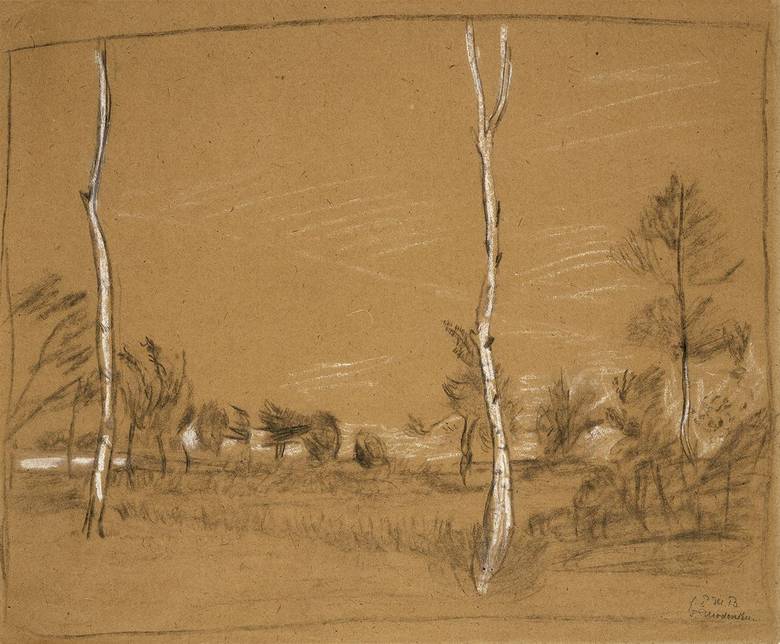Featured image: A charcoal landscape by Paula Modersohn-Becker entitled “Landschaft mit Birken” (1907), the same artist who painted a famous portrait of Rainer Maria Rilke.
Today there is no shortage of Jewish questions. Many of them stem from Jews’ newfound power as the ruling class in Israel-Palestine or for some, as beneficiaries of American whiteness. That is, how does a group that has been characterized by oppression act ethically when suddenly granted the opportunity to oppress? What should the role of ethnicity be in contemporary Judaism, especially vis-a-vis race? What does contemporary Jewish solidarity look like? What does it mean to be a Jew of today’s diaspora? How we answer these questions will define our generation and impact the generations to come.
Perhaps it will clarify our own Jewish questions to look back to a place and a time, let’s say Germany, after Jewish emancipation, when there was only one Jewish Question. It is difficult to say what exactly the Question was. It was more a discourse than a definite query. Perhaps it is best cast into words as, “What is to be done with the Jews?” As the great empires of Europe began to disintegrate and imperial internationalism gave way to nationalist politics, this question increased in pertinence. If every nation should have a state that serves that nation, how do the Jews fit in? What is to be done with this internal other – operating within the state but of a distinct nation?
There were many answers to this question, but today the best known is the Nazi’s: total extermination. Though they failed in their genocidal mission, they did succeed in making theirs the final solution. The Jewish Question they had known was asked no more.
But before that, the Jewish question was a theme of central political and cultural importance to European — and especially German — Jews and non-Jews alike. The subtitle of Herzl’s seminal Zionist pamphlet Der Judenstaat read “An Attempt toward a Modern Solution to the Jewish Question.” Even Zionism was born out of the discourse of the Jewish Question. What should Jews do as internal others within states that are set up to serve particular nations? Herzl’s answer: create a state of their own.
Zionism was among the most popular solutions to the Jewish question among German Jews, rivaled only by assimilationism. Opposite Herzl, the most important proponent of a conservative, assimilationist solution to the Jewish question in post-emancipation Germany was the Centralverein deutscher Staatsbürger jüdischen Glaubens (“the Central Union of German Citizens of Jewish Faith.”) The syntax of this organization’s name betrays its preoccupations: the members of the Centralverein sought to prioritize their status as citizens of the German empire despite their coinciding status as Jews. When one considers that empire-wide Jewish emancipation only came to pass in 1871, a scant twenty years before the Centralvereins founding, and that antisemitic polemics such as The Victory of Jewry over Germanness (1879) had recently won great popular acceptance, the reasons for this conservative stance become more clear. They decided to subvert and diminish their Jewishness in order to prove loyalty to a state of which they were not the constituent nation.
But, to quote Hofshteyn, “One generation sinks into the abyss, one eruption comes after the next.” The next cohort of German Jewish politicians had a distinctly different alignment. More left wing, more socially concerned, and more radical, the Jews who rose to prominence in the early 20th century envisioned political solutions in which Jewishness could be centered instead of subverted. There were still assimilationists, of course, but there were also radical voices: socialist, Zionist, diasporist, or some combination thereof.
There are few political actors so iconic of this generation as Julius Moses, a social democrat born at the very eastern edge of the German empire in 1868 and murdered in Theresienstadt. Growing up in poverty in what is now Polish Poznan but educated in German institutions, eventually becoming a doctor, Moses was situated in a position somewhere between acculturated German-Jews and Ostjuden, a term used by German-Jews to refer to the unassimilated Jewish masses of the east. This mix prepared him to operate within German speaking, bourgeois political circles, while also understanding and fighting for the poor and the outcast, Jewish and gentile alike.
Around the turn of the century, Moses moved to Berlin to begin a career in Jewish publishing. He founded his own press from which he began to publish the General-Anzeiger für die gesamten Interessen des Judentums (“The General-Journal for the Comprehensive Interests of the Jewry”) and in 1903 began to publish the satirical journal Schlemiel. The General-Anzeiger was meant to be a shock to the system of the German-Jewish press; in the programmatic first article of the journal, Moses wrote that Jewry “must intervene in its own destiny; it must participate in the creation of its own destiny. Or else it will become the plaything of chance.”
In 1906, Julius Moses published a call for responses to the prompt “The Solution to the Jewish Question.” He received about 3,000 submissions from Jews and non-Jews, from politicians, writers, artists, and thinkers of all sorts. Moses selected about 100 of them and published these in a booklet. Though at this point in his life Moses firmly identified as a Zionist, he published solutions of all ideological bents, from Assimilationism to Zionism, from Diasporism to full-blown Antisemitism. Moses hoped that this booklet would provide witness to the Jewish question of his day with all the possible manifestations of its solutions, and to its importance not only as a political question, but as a space for thought and as a locus of inspiration and engine for progress in the realms of art and culture in and outside of the Jewish community.
Of the responses, there is none that proposes as radical a defense of Jewish Diasporism as that of Rainer Maria Rilke. There is a relative dearth of truly Diasporist responses, likely because most of this discourse was being conducted in Yiddish, the language of the unassimilated Jewish masses. But Rilke, the gentile German poet born in Bohemia (not far from where Moses would eventually be murdered) expresses in German a solution to the Jewish question similar to that of the Bund. Rilke writes of Jewish diaspora not as a problem that needs to be fixed, but as a unique opportunity for immediate connection with the divine. Perhaps without even knowing he is doing so, Rilke echoes the long established metaphor of the Talmud and Jewish practice more generally as portable homelands for the Jewish people, writing that “The Jewish people, it is my conjecture, needs just one single turn, and it will again stand before its own unforgettable God, who has always been its homeland and stony refuge.”
In terms of politics, Rilke came to the Jewish question from the outside. Its political implications would have little effect on him. But Rilke did not see the Jewish question as purely a political one, nor did he consider an effective solution to it to be only of importance to the Jews. For Rilke, the Jewish question is a question every person must answer for themselves. It is not, “Where in the world should the Jews live?” but “How does a person make a home in the world?”
Today, it is still of great importance to understand the universality of the Jewish condition and the effects that our Jewish questions will have. Rilke understands Jewishness not only as a question of ethnicity and nation, but also as a sort of positional question whose answer can sublimate vulnerability into raw, direct connection with the divine. This is a lesson that can be of great use to us. For your consideration, I include here Rilke’s response, translated in full.
The question of the individual, which is to the practitioner of artistic experience always pressing, overrides that other question of the destiny of a collective; so deeply is every union determined by the nature of its members. Rash and impatient attempts to manufacture the individual have indeed brought him into disrepute. Be that as it may, we would not be able to find sense in all that for which we agitate and struggle, were it denied to us to await and to desire that every individual could become, to some extent and as much as possible, much more than he is. This development of the individual will proceed very slowly and invisibly within the collective, which, according to its nature, will alternatingly support and restrict it (serving it with both).
National reflection, which seems so disconcerting in a time of international rapprochement, is perhaps a first attempt to create an individual writ large: individual states of strong personality that bring themselves earnestly to fruition. One can already discern how the individual commonwealths transform themselves, how they desire to take on active forms: those which, unified and vibrant, deal outwardly. (Germany doing so most decidedly and crudely.) The need for one’s own qualities, their designation and exercise, becomes ever more apparent. Politics seems tired of hiding; it wants to demonstrate. The desire for national churches awakens here and there (understandably so, because this will also become the stipulation for the individual: that he enter into and construct his own autonomous relationship with God). Here, however, they are all embarrassed. The national church has nationalized piousness. He, however, who was already internally full of religious need has long since established for himself an exchange with God and is thereby two steps ahead of the still to be created national consciousness.
Here (I posit) the Jewish people must come to action. Because, oppressed and set-back and defamed as it may be, it must be allowed to operate its own real and forceful progression. It must with stubborn single-mindedness attempt to base its existence upon the fact that its race corresponds to a religion (or perhaps better a religiosity) from which it cannot be separated. Everyone for himself, on the place upon which he has been dispersed, must be concerned with the connection to the great, old God, in contact with whom his defacement and hiddenness will become an ornament, a graphic character, an expression of awe. Because this last great, immediate shape of God has as of yet surrendered none of its force and significance, and the wrath and patience that in it seem excessive are in life no less great and inexorable.
The Jewish people, it is my conjecture, needs just one single turn, and it will again stand before its own unforgettable God, who has always been its homeland and stony refuge. If the Jewish people returns its destiny to this place and withdraws the hands that play and gamble with it, it could again be in possession of its own growing being: within the terrible fruitfulness that lies in the preservation of a great God.

